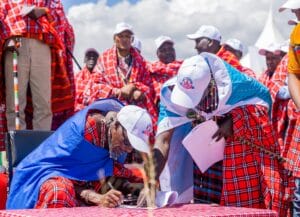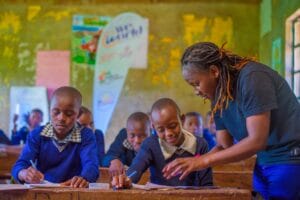
How can we deconstruct the colonial approaches that still permeate practices for sustainability and the ecological transition? What are the effects on human rights and communities, and what is the role of women and grassroots movements, especially in the agricultural sector and along global production chains?
These questions will be addressed in “Decolonising Land and Bodies”, a series of two online webinars hosted by WeWorld, along with freelance journalist Leila Belhadj Mohamed and featuring contributions from experts from Kenya, Italy, and Belgium. The meetings are designed for those who want to critically question dominant narratives and build new paradigms for social and environmental justice. Each webinar is structured into two sessions: an interactive peer-to-peer training, and an empowerment session.
Register for each webinar session to participate.
Webinar 1 – Decolonising governance for ecological transition: empowering women’s leadership
November 27th, 14:30 – 16:00 (online) CET // 16:30 – 18 EAT
Two sessions to analyze how advocacy processes and international negotiations for climate and human rights can reproduce extractive logics, and how women’s leadership can transform them into tools for emancipation. With: Leila Belhadj Mohamed, freelance journalist; Lydia Kingeru, Kenyan climate activist and WeWorld representative at COP30.
To participate in the free webinar, register here.
Webinar 2 – Decolonising food supply chains: Grassroots Power and Agroecology
December 3rd, 10:30 – 12:00 (online) CET // 12:30 – 14:00 EAT
An in-depth look at agroecology as a practice of resistance and territorial self-determination, and a discussion on the role of grassroots movements to oppose extractive agricultural models. With: Leila Belhadj Mohamed, freelance journalist; Pier Francesco Pandolfi de Rinaldis, Coordinator of the Associazione Rurale Italiana, member of the European Coordination Via Campesina.
To participate in the free webinar, register here.
The meetings are designed for youth, activists, studendts, but also farmers, workers in the cooperation sector, and anyone who wants to deepen their understanding of the kink between social and environmental justice and decolonization. This is an opportunity to reflect, exchange ideas, and build alternative prosepects.
The "Decolonising Land and Bodies" webinar series is promoted by the European projects WORLD: Our World Our Planet and Rebooting the Food System:
- Our World Our Planet is funded by the European Union through the Erasmus+ program. Its goal is to engage young people from Austria, Italy, Kenya, Tanzania, and Uganda through Virtual Exchange methodology and online interactions, promoting effective solutions against climate change and fostering women’s empowerment. Within the webinar series Decolonising Land and Bodies, it promotes the 2 interactive peer-to-peer training on female leadership and decoloniality, targeting young participants in the five countries.
- Rebooting the Food System, on the other hand, is co-funded by the European Union under the DEAR program (Development Education and Awareness Raising). Its aim is to raise awareness and mobilize younger generations in Europe as agents of change for a fairer and more sustainable food system. It contributes to the Decolonising Land and Bodies webinar series, with 2 empowerment sessions on extractive production systems, sustainable agriculture, and agroecology, addressing young people and farmers from Italy.



